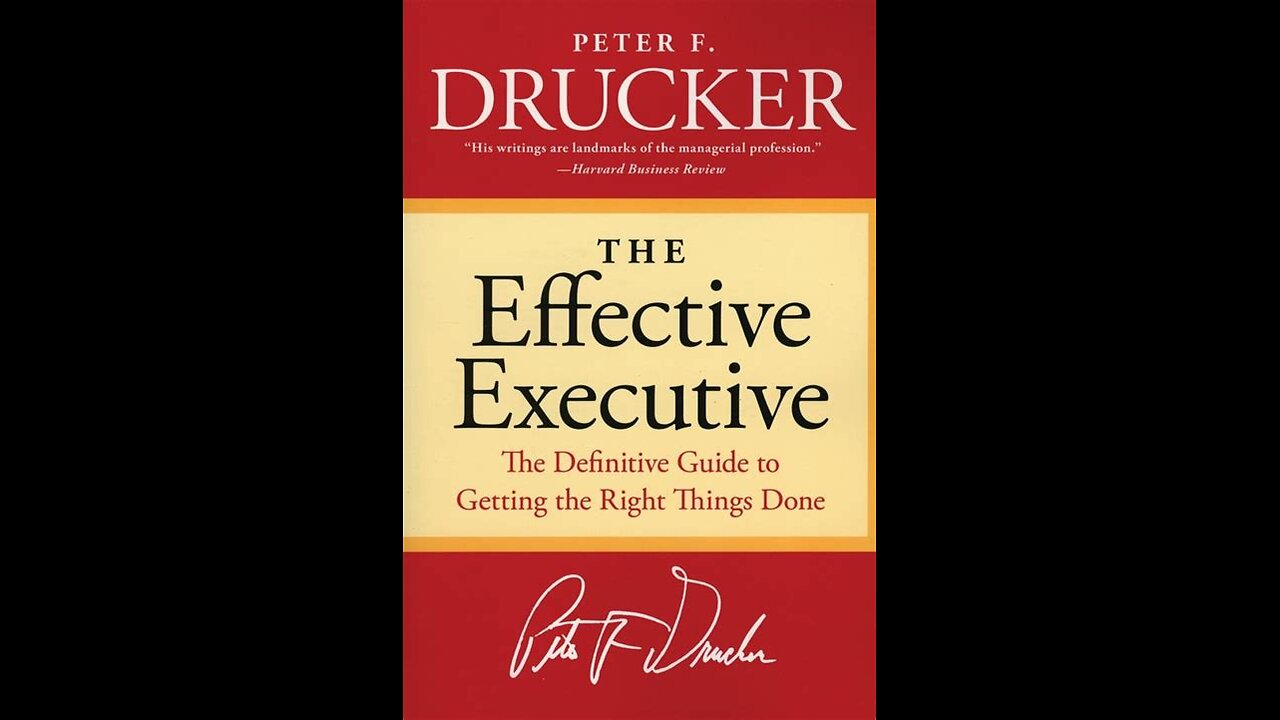Premium Only Content

The Effective Executive by Peter F. Drucker | Summary
Buy Here: https://amzn.to/3Q5d9bH
"""The Effective Executive: The Definitive Guide to Getting the Right Things Done"" by Peter F. Drucker is a classic management book that offers timeless principles and practical advice on how to become a more effective and successful executive. Drucker focuses on the key responsibilities and habits of effective executives, providing insights into managing oneself, time, and relationships to achieve greater productivity and results.
Here is a summary of the key ideas and principles discussed in ""The Effective Executive"":
1. Knowing Thyself: Drucker emphasizes the importance of self-awareness for effective leadership. Executives need to understand their strengths, weaknesses, values, and priorities to make informed decisions and allocate their time and resources wisely.
2. Focus on Contribution: The book highlights the significance of focusing on contributions rather than just activities. Effective executives prioritize tasks that align with their organization's goals and have the highest impact. They constantly ask themselves, ""What can I contribute that will significantly affect the results of the organization?""
3. Setting Clear Objectives: Drucker emphasizes the need for clear and measurable objectives to guide decision-making and performance. Effective executives set SMART (Specific, Measurable, Achievable, Relevant, Time-bound) goals that provide a clear direction for themselves and their teams.
4. Making Effective Decisions: The book delves into the decision-making process of effective executives. Drucker emphasizes the importance of gathering relevant information, considering different perspectives, and weighing the potential risks and benefits before making a decision. Executives should also be willing to take responsibility for their decisions and learn from both successes and failures.
5. Managing Time Effectively: ""The Effective Executive"" provides insights on how executives can better manage their time to maximize productivity. Drucker suggests eliminating time-wasting activities, setting priorities, and focusing on high-value tasks. He also emphasizes the importance of delegation and empowering others to handle routine tasks.
6. Building Effective Teams: The book highlights the role of effective teams in organizational success. Drucker discusses the importance of hiring and developing talented individuals, fostering collaboration, and creating a culture of trust and accountability within teams.
7. Continual Learning and Improvement: Drucker encourages executives to embrace a mindset of continual learning and improvement. Effective executives seek feedback, stay current with industry trends, and invest in their own professional development. They also encourage a culture of learning within their organizations.
""The Effective Executive"" serves as a guide for executives, managers, and aspiring leaders to enhance their effectiveness and achieve better results. Drucker's principles and insights provide a roadmap for making sound decisions, managing time efficiently, and fostering a productive work environment. By applying the concepts discussed in the book, individuals can become more effective leaders who drive organizational success and create a positive impact."
-
 4:19:36
4:19:36
SynthTrax & DJ Cheezus Livestreams
20 hours agoFriday Night Synthwave 80s 90s Electronica and more DJ MIX Livestream THE GREAT EDO WARS OF 2067 Edition
91.7K10 -
 4:45:15
4:45:15
RalliedLIVE
11 hours ago $1.90 earnedWarzone Domination w/ Ral
65.1K1 -
 1:10:17
1:10:17
Sarah Westall
12 hours agoWorld Leaders Increasingly Display Panic Behavior as Economic Change Accelerates w/ Andy Schectman
95.7K20 -
 59:54
59:54
Motherland Casino
9 hours ago $2.29 earnedScar x Ayanna
42.3K7 -
 41:57
41:57
BonginoReport
15 hours agoProtecting Kids From WOKE Ideology in School (Ep. 35) - Nightly Scroll with Hayley Caronia -04/25/25
129K51 -
 7:17:12
7:17:12
SpartakusLIVE
12 hours agoFriday Night HYPE w/ #1 All-American Solo NUKE Hero
33.8K -
 1:15:07
1:15:07
Kim Iversen
1 day agoThe Left Is Dead — What And Who Will Rise From the Ashes?
110K109 -
 2:06:17
2:06:17
Joker Effect
10 hours agoYOU DON'T UNDERSTAND FREEDOM OF SPEECH IF THIS MAKES YOU MAD!
17.9K2 -
 1:45:26
1:45:26
vivafrei
16 hours agoSantos Sentenced to 87 MONTHS! Corrupt Judges ARRESTED! Some Canada Stuff & MORE!
147K106 -
 4:34:03
4:34:03
Nerdrotic
16 hours ago $34.71 earnedStar Wars GRAPED? Hollywood In Freefall, Silver Surfer is a MAN! | Friday Night Tights 351
106K36